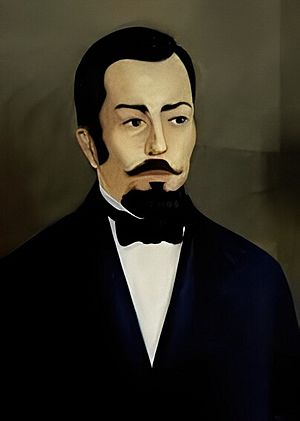Laureano Pineda facts for kids
Quick facts for kids
José Laureano Pineda Ugarte
|
|
|---|---|
 |
|
| Supreme Director of Nicaragua | |
| In office 11 November 1851 – 1 April 1853 |
|
| Leader | José Trinidad Muñoz |
| Preceded by | Fulgencio Vega |
| Succeeded by | Fruto Chamorro |
| In office 4 August 1851 – 2 November 1851 |
|
| Preceded by | Justo Abaunza |
| Succeeded by | Fulgencio Vega |
| In office 5 May 1851 – 4 August 1851 |
|
| Preceded by | Justo Abaunza |
| Succeeded by | Justo Abaunza |
| Personal details | |
| Born | 4 July 1802 Potosí, Rivas, Captaincy General of Guatemala |
| Died | 17 September 1853 (aged 51) Managua, State of Nicaragua |
| Political party | Democratic |
| Spouse | Dolores Sacasa Méndez |
| Parents | Pedro Benito Pineda Juana Rufina Ugarte Selva |
| Occupation | Politician, lawyer |
José Laureano Pineda Ugarte (born 4 July 1802 – died 17 September 1853) was an important Nicaraguan lawyer and politician. He was a Senator in the Legislative Assembly and a member of the Democratic Party. He served as the leader of Nicaragua, known as the Supreme Director, three times.
He was first chosen on 1 April 1851. Later, he was removed from office by a military takeover. He then led from Honduras, and finally shared power with another leader, Fulgencio Vega, starting on 11 November of the same year.
Contents
Early Life and Family
José Laureano Pineda Ugarte was born in Potosí, Nicaragua, on 4 July 1802. His father was Pedro Benito Pineda, who also led Nicaragua from 1826 to 1827. His mother was Juana Rufina Ugarte Selva.
He married Dolores Sacasa Méndez. Her father, Crisanto Sacasa y Parodi, was a well-known conservative leader in Nicaragua.
Starting a Political Career
In 1825, José Laureano Pineda Ugarte finished his law studies at the Royal University of León. He believed in liberal ideas and strongly supported Central America becoming independent from Spain.
In 1835, he wrote Nicaragua's first set of laws about crimes and punishments, called the Penal Code. The National Assembly approved these laws in 1839. He also worked as the Minister of Government under another leader, Supreme Director José León Sandoval.
British Influence in Nicaragua
In 1848, he was elected to the group that wrote the country's laws. He was one of the few who refused to sign a treaty called the Treaty of Cuba. This treaty was forced on Nicaragua by the British Empire after they invaded and reached Lake Nicaragua. Because of this treaty, Nicaragua had to give up the port city of San Juan del Norte to the Mosquito Coast, which was under British influence.
Leading Nicaragua
Pineda won the election to become Supreme Director in 1851. He was supposed to start on 1 April, but he couldn't take office right away. So, another senator, Justo Abaunza, took over until Pineda could officially start on 5 May.
The 1851 Coup
On 4 August 1851, a military general named José Trinidad Muñoz led a sudden takeover, called a coup d'état. He removed Pineda from power. Muñoz then put Abaunza back in charge temporarily in the city of León. Another leader, José Francisco del Montenegro, took charge in Granada. Pineda and his government had to leave the country and go to Honduras. From Honduras, Pineda declared himself the true Supreme Director.
Montenegro died just six days later, on 11 August. José de Jesús Alfaro then took his place.
Pineda returned to Nicaragua with military help from the President of Honduras, Juan Lindo. His troops, led by General Fruto Chamorro, surrounded the city of León. The city gave up, but only if Pineda promised not to punish Abaunza. However, the Nicaraguan parliament later said that Abaunza was already protected by law.
After the Coup
After the coup, Pineda first shared power with Fulgencio Vega. Later, he ruled alone. He made many changes to how the country was run. On 15 February 1852, he and Vega officially made Managua the capital city. This helped stop the fighting between the cities of Granada and León over which one should be the capital.
His Death and What He Left Behind
José Laureano Pineda Ugarte died on 17 September 1853. His time as leader was very good for Nicaragua. He helped create new schools, made roads better, and improved how the government worked. Many people consider him one of Nicaragua's best leaders in the 1800s, before the Filibuster War.
See also
 In Spanish: José Laureano Pineda Ugarte para niños
In Spanish: José Laureano Pineda Ugarte para niños
 | Valerie Thomas |
 | Frederick McKinley Jones |
 | George Edward Alcorn Jr. |
 | Thomas Mensah |

